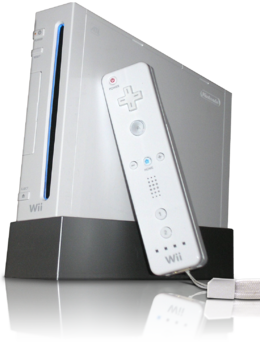Wii: Difference between revisions
(Undid edit by The Awesome: see reason for reverting move) |
The Awesome (talk | contribs) m (The Awesome moved page Wii to Nintendo Wii over redirect) |
(No difference)
| |
Revision as of 17:42, September 20, 2012
| Wii | |
|---|---|
 | |
| Manufacturer | Nintendo |
| Type | Video game console |
| Generation | Seventh generation era |
| First available | |
| CPU | IBM PowerPC-based[1] "Broadway" |
| GPU | ATI "Hollywood" |
| Media | 12 cm Wii Optical Disc 8 cm Nintendo GameCube Game Disc |
| System storage | 512 MB Internal flash memory Secure Digital card Nintendo GameCube Memory Card |
| Controller input | Wii remote, Nintendo GameCube controller |
| Connectivity | Wi-Fi Bluetooth USB 2.0 x2 LAN Adapter (via USB) |
| Online service | Nintendo Wi-Fi Connection WiiConnect24 Virtual Console Wii Menu |
| Backward compatibility | Nintendo GameCube |
| Predecessor | Nintendo GameCube |
| Successor | Wii U |
| Article on Nintendo Wiki | Wii |
The Wii (pronounced the same as the pronoun "we", IPA: [wiː]) is the fifth home video game console released by Nintendo. The console is the direct successor to the Nintendo GameCube. Nintendo states that its console targets a broader demographic than that of Microsoft's Xbox 360 and Sony's PlayStation 3, but it competes with both as part of the seventh generation of video game systems, despite being noticeably underpowered compared to its rivals.
A distinguishing feature of the console is its wireless controller, the Wii remote, which can be used as a handheld pointing device and can detect acceleration and orientation in three dimensions. Another feature is WiiConnect24, which enables it to receive messages and updates over the Internet while in standby mode. The Wii remote and nunchuck combination can be used to play Super Smash Bros. Brawl, while the Wii remote (turned on it's side), the Classic Controller for Brawl, or a GameCube controller may also be used.
Nintendo first spoke of the console at the 2004 E3 press conference and later unveiled the system at the 2005 E3. Satoru Iwata revealed a prototype of the controller at the September 2005 Tokyo Game Show. At E3 2006, the console won the first of several awards. By December 8, 2006, it had completed its launch in four key markets. The Financial Times reported that as of September 12, 2007, the Wii is the sales leader of its generation, based on sales figures from Enterbrain, NPD Group and GfK.
In the Super Smash Bros. series
Super Smash Bros. Brawl is a Super Smash Bros. game released game for the Wii in 2008. Backwards compatibility allows for Super Smash Bros. Melee to be played on the Wii, but with GameCube controllers instead of the Wii Remote and the Nunchuck. Also, Super Smash Bros. for the Nintendo 64 has been released on the Virtual Console in Japan, Europe and America for 1000 Wii Points. This makes it possible to play the first three Smash Bros. games on the Wii.
Trivia
- The Wii is the first Nintendo console on which one could play all three games in the Super Smash Bros. series.
References
- ^ Wii: The Total Story. IGN. Retrieved on 2006-11-20.
| Nintendo consoles | |
|---|---|
| Home consoles | Color TV-Game 15 · Nintendo Entertainment System · Super Nintendo Entertainment System · Virtual Boy · Nintendo 64 · Nintendo GameCube · Wii · Wii U |
| Handheld consoles | Game & Watch · Game Boy · Game Boy Color · Game Boy Advance · Nintendo DS · Nintendo 3DS |
| Hybrid consoles | Nintendo Switch |